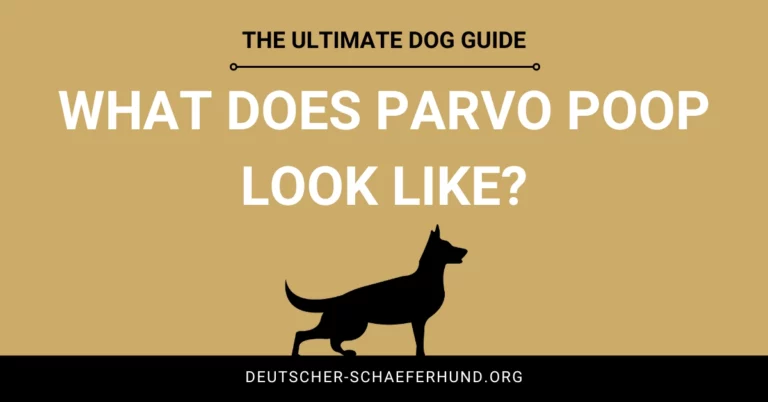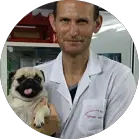If you have a dog, there’s a good chance you’ve heard of Parvo. It’s a nasty virus that can make your dog very sick – and in some cases, it can be deadly.
In this post, we will discuss what Canine Parvovirus is, what the symptoms are, and how to treat it if your dog becomes infected. We’ll also take a look at what “Parvo Poop” is and what it looks like. If you think your dog may have contracted Parvo, don’t wait – get him to the vet right away!
 Written By Sergey Uhanov – Certified Veterinarian.
Written By Sergey Uhanov – Certified Veterinarian.
Sergey Uhanov is a certified veterinarian for dogs over 20 years, breeding 3 dogs. He loves dogs and has his own pet clinic in Israel. He likes to help other people with their dogs by sharing his experience and knowledge.
What is Parvo?
Canine Parvovirus, or “Parvo” for short, is a highly contagious virus that affects dogs of all ages. It is most commonly seen in puppies who are not yet vaccinated, but adult dogs can also become infected. The virus attacks the gastrointestinal tract and can cause severe vomiting and diarrhea. If left untreated, Parvo can be fatal.
The symptoms of Parvo include vomiting, diarrhea (which may be bloody), lethargy, and a loss of appetite. If you notice any of these signs in your dog, take him to the vet right away. Early diagnosis and treatment are critical for a successful outcome.
Parvo is treated with a combination of intensive supportive care and antiviral medications. Unfortunately, there is no cure for Parvo and treatment is expensive. The good news is that most dogs who receive early diagnosis and treatment will recover from the virus.
“Parvo Poop” is the name given to diarrhea that is often seen in dogs with Parvo. It is usually bloody and smells incredibly foul. If you see Parvo Poop, it’s important to clean it up immediately and wash your hands thoroughly. You’ll also want to disinfect any areas where your dog may have been – this will help prevent the spread of the virus.
If you think your dog may have Parvo, don’t wait – get him to the vet right away. Parvo is a serious virus, but most dogs who receive early treatment will recover from it.
How Do Dogs Get Parvo?
There are a few different ways that dogs can contract the parvovirus, but the most common is through contact with infected feces. If an infected dog defecates in an area where other dogs have access, they can easily contract the virus by sniffing or licking the contaminated ground.
The virus can also spread through direct contact with an infected dog, or by sharing contaminated food or water bowls. Puppies are particularly susceptible to the virus since their immune systems are not yet fully developed, but adult dogs can also contract parvovirus if they are not up-to-date on their vaccinations.
Parvo Poop Color
There are a few things to keep in mind when it comes to parvo poop. First, the color can vary from brown to black. Second, it will often be runny and watery. Finally, there may be blood or mucus in the stool. If you see any of these signs, it’s important to take your dog to the vet immediately.
Parvo is a serious virus that can be deadly for dogs, so it’s important to be aware of the symptoms. If you think your dog may have parvo, don’t hesitate to contact your veterinarian. Early diagnosis and treatment are key to giving your dog the best chance of recovery.
Can Humans Get Parvo?
No, humans cannot get parvo. Parvovirus B19 is the only known virus in the parvovirus family that can infect humans. This virus is also known as the fifth disease or erythema infectiosum. It most commonly affects children between the ages of five and 15, but it can also affect adults.
Symptoms of the fifth disease include a red, blotchy rash on the face, fever, and cold-like symptoms. In severe cases, the virus can cause anemia or low platelet levels, which can lead to serious complications. There is no specific treatment for the fifth disease, but most people recover within two to three weeks.
How Is Parvovirus Diagnosed in Dogs?
A dog with parvs will typically have severe diarrhea, vomiting, and weight loss. A blood test can be used to confirm the diagnosis. Treatment for parvovirus generally includes hospitalization, IV fluids, antibiotics, and supportive care. Prevention of parvovirus is through vaccination.
If you think your dog may have parvovirus, it is important to contact your veterinarian immediately. They will be able to perform the necessary tests and start treatment right away.
Parvovirus is a serious disease that can be deadly for dogs, so it is important to do everything you can to prevent it. Vaccinating your dog is the best way to protect them from this potentially deadly virus.
If you have any questions about parvovirus or vaccination, please contact your veterinarian. They will be happy to help you keep your dog healthy and safe.
What Does Parvo Poop Look Like?
There are a few things you can look for when trying to determine if your dog has parvo. One of the most obvious signs is the appearance of their poop.
Parvo poop is typically bloody and mucus-like, and it can have a very strong smell. If you notice any changes in your dog’s stool, it’s important to contact your veterinarian right away.
Another sign of parvo is vomiting. If your dog is throwing up blood or has bloody diarrhea, this is a serious sign that they need medical attention. Other symptoms include lethargy, loss of appetite, and fever.
What does Parvo Smell like?
No one wants to talk about it, but everyone wants to know. What does parvo poop smell like? The answer might surprise you.
While the odor of any kind of animal feces can be unpleasant, there is something particularly foul about parvo dog poop. Many people describe it as smelling like death or rotting flesh. If you have ever had the misfortune of smelling it, you will likely never forget it.
So why does parvo smell so bad? The answer has to do with the virus itself. Parvovirus is a highly contagious disease that affects dogs of all ages but is most common in puppies. The virus attacks the gastrointestinal tract and can cause severe vomiting and diarrhea.
One of the most distinctive features of parvo is the bloody, mucus-like stool that it produces. This foul-smelling substance is full of the virus, which is why it smells so bad. And because the virus is highly contagious, it only takes a small amount to make your dog sick.
If you think your dog may have parvo, it is important to seek veterinary care immediately. While there is no cure for the virus, early treatment can help improve your dog’s chances of survival. With prompt medical attention, many dogs recover from parvo and go on to live long and healthy lives.
Parvo Warning Signs in Dogs
How to tell if a dog has parvo?
There are a few things to look out for when it comes to parvo poop. The first is the color. Parvo poop is typically very bloody and may be tinged with green or brown. It will often have a putrid smell as well.
Another sign of parvo in poop is consistency. It will be watery and may contain mucus or pus. Finally, you may see diarrhea or vomiting associated with parvo poop. If your dog has any of these signs, it’s important to seek veterinary care immediately.
Parvo is a serious disease that can be deadly for dogs. However, prompt treatment can often lead to a full recovery. If you think your dog may have parvo, don’t hesitate to contact your veterinarian.
Did you know that parvo is one of the most common deadly diseases in dogs? It’s important to be aware of the signs and symptoms so you can get your dog treatment as soon as possible if necessary. Keep an eye on your dog’s poop for any of the following warning signs:
- Bloody or tinged with green or brown
- Putrid smell
- Watery consistency
- Mucus or pus
- Diarrhea or vomiting
If you see any of these signs, don’t hesitate to contact your veterinarian.
How Much Does Parvo Treatment Cost?
No one wants to think about their dog’s poop, but when your dog has parvo, it’s all you can think about. Parvo is a virus that attacks the intestines and causes severe diarrhea. It is spread through contact with infected feces and is most common in puppies who have not been vaccinated.
Treatment for parvovirus poop is expensive, so it’s important to know how much it will cost before you decide whether or not to treat your dog.
The average cost of parvo treatment is $500-$2000 (€475 – €1900). This includes the cost of hospitalization, medications, and lab tests.
The most expensive part of treatment is usually hospitalization, which can cost $200-$500 (€190 – €475) per day. Medications and lab tests can add another $300-$700 (€275 – €650) to the total cost.
If your dog is diagnosed with parvo, you will need to decide whether or not to treat them. The decision should be based on your financial situation and your dog’s prognosis.
If you decide to treat your dog, be prepared for a large bill. However, the cost of treatment is worth it if it means saving your dog’s life.
How to Prevent Your Dog from Getting Parvo?
There are a few things you can do to help prevent your dog from getting parvo. First, make sure they are up to date on their vaccinations.
Puppies should receive their first set of shots at around six to eight weeks old, and then booster shots every three to four weeks until they are 16 weeks old. After that, they should get an annual booster shot.
Second, keep your dog away from places where other sick dogs have been. This is especially important if you have a young puppy, as they are more susceptible to the disease. If you know of any place where there has been a recent outbreak of parvo, avoid it altogether.
Finally, keep your dog clean. This means regular baths and brushing, as well as cleaning up any messes they make right away. A clean environment is less likely to harbor the virus that causes parvo.
By following these simple tips, you can help keep your beloved furry friend safe from this deadly disease.
Can a Vaccinated Dog Get Parvo?
The short answer is yes. Even though your dog may be vaccinated, there is always a small chance that they can still contract the virus.
The good news is that if your dog does get parvo, the chances of them recovering are much higher if they have been vaccinated. Vaccinated dogs who contract parvo will usually only experience mild symptoms and will recover quickly.
So, should you worry if your vaccinated dog comes in contact with an infected dog? Probably not. The chances of them getting sick are very low. However, if you are still concerned, you can always have your vet do a quick test to see if they have the virus.
Can a Dog Get Parvovirus Twice?
No, a dog cannot get parvovirus twice. Once a dog has had the virus, they are immune to it for life. However, if a dog has never been exposed to the virus before, it can certainly contract it more than once.
Parvovirus is highly contagious and can be easily spread through contact with contaminated feces. Therefore, it is important to practice good hygiene and clean up after your dog immediately if they have any accidents.
Conclusion
Parvovirus is a deadly disease in dogs. There is no cure for parvo yet. However, if you take the early necessary steps, the chances of survival go up.
Make sure to get your GSD vaccinated. If you notice any irregularities in your dog, please contact your veterinarian immediately.



